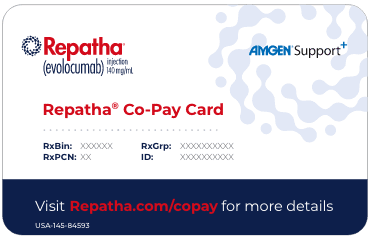Whether you’re first starting or have already been taking Repatha®, you may be wondering “How can I reduce my out-of-pocket cost?” For eligible commercially insured patients, the Repatha® Co-Pay Card may help you get Repatha® for as little as $5 a month.*
If you have commercial or private prescription insurance through your employer, your spouse’s employer, or through a private insurance carrier, the Repatha® Co-Pay Card reduces your out-of-pocket costs for Repatha® if you’re eligible. These costs include copayments, coinsurance, and prescription deductibles, subject to plan design. Eligible commercially insured patients may pay $5 per month* with the Repatha® Co-Pay Card. You are not eligible if you are enrolled in any government-funded healthcare program, such as Medicare, Medicare Advantage, Medicare Part D, the Retiree Drug Subsidy program, Medicaid, Medigap, Veterans Affairs, Department of Defense, or TRICARE®.
Once you receive your unique Co-Pay card information via a confirmation message or email, you can use this information every time you fill your Repatha® prescription, up to program maximums.
*Terms and conditions and program maximums apply.






